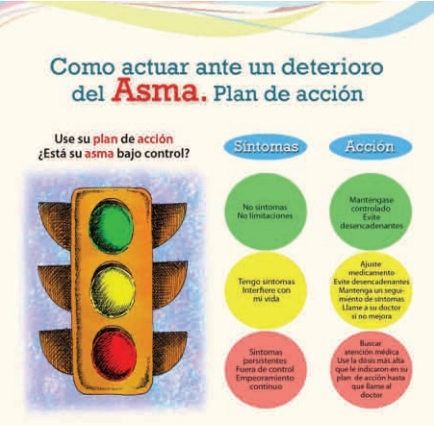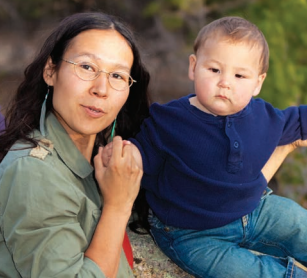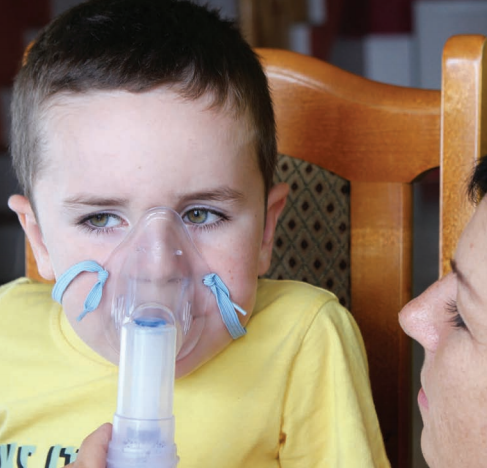AllerGen KMb Projects: Education/Empowerment
AllerGen KMb Projects: Policy Impact
AllerGen KMb Projects – Education / Empowerment
Peer Power: Helping Allergic Kids to Help Each Other
Project: Sustainable Online Support for Children and Adolescents Affected by Asthma and Allergies
Principal investigator: Miriam Stewart
Children and teens across Canada are benefiting from the online peer support programs developed by this project.
Asthma patients breathe easier in El Salvador
Project: International Union Against Tuberculosis and Lung Disease IPI: El Salvador
Principal investigator: Dean Befus
To further support the ability of healthcare providers to educate patients and their families about asthma in El Salvador, Dr. Befus and his team developed a set of Spanish-language teaching tools, including flipcharts and an action plan.
 'Home-Grown' Asthma Support for Aboriginal Children and Youth
'Home-Grown' Asthma Support for Aboriginal Children and Youth
Project: Engaging Aboriginal families affected by allergies and asthma in support-education program development
Principal investigator: Miriam Stewart
Dr. Stewart hopes that this work will spur the creation of sustainable programs and inform the development of government policies to support them.
 Using the Internet to Improve Education and Support for Canadian Children, Teens, and Parents Affected by Asthma and Allergies
Using the Internet to Improve Education and Support for Canadian Children, Teens, and Parents Affected by Asthma and Allergies
Project: Building continuity of support for allergic children with asthma and/or anaphylaxis and their families
Principal investigator: Miriam Stewart
The web-based support tools and education programs designed by Dr. Stewart’s team not only meet the needs of children and teens living with severe allergies and asthma regardless of where they live in Canada, but also the needs of their parents.
 A New Generation of e-Learning Tools for Asthma Education
A New Generation of e-Learning Tools for Asthma Education
Project: Can e-health tools improve health outcomes in asthma?
Principal investigators: Scott Tebbutt, Anthony Levinson
“Animations can make science exciting,” notes Dr. Tebbutt. “They also have high impact and help people better remember what is being taught.” Dr. Levinson reports that people from all over the world have been accessing and incorporating their animations into local education programs.
 Teaching Kids with Asthma How to Take Charge of Their Health
Teaching Kids with Asthma How to Take Charge of Their Health
Project: Enhancing RAP for First Nations Communities
Principal investigator: Allan Becker
The program equips children and their peers with the knowledge, as well as the confidence, skills and tools to control their asthma, needed to keep them healthier over their lifetime.
AllerGen KMb Projects – Policy
More Choice, Less Risk for those with Food Allergies
Project: CanFAST, SPAACE, SCAAALAR
Principal investigators: Susan Elliott, Ann Clarke
Dr. Elliott’s long-range vision, which she shares with many colleagues and other food allergy stakeholders, requires the government’s full support. Their big aspiration: a national food allergy strategy for Canada.
 The Ethics of Biobanking: Is the Public On Board?
The Ethics of Biobanking: Is the Public On Board?
Project: White Paper Series
Principal investigator: Timothy Caulfield
Professor Caulfield hopes to contribute to the creation of ethical and enforceable guidelines for biobanking, and health policies that “rest on a base of evidence—just like good science.”
 From Traffic Lanes to Twitchy Lungs
From Traffic Lanes to Twitchy Lungs
Project: Traffic-related air pollution as a risk factor for the development of childhood asthma
Principal investigator: Michael Brauer
Dr. Brauer favours urban planning strategies that separate roads and vehicles from people… He would like to see human health, rather than convenience, inform roadway design policies.
 A Canadian Quest for Higher Quality Asthma Care
A Canadian Quest for Higher Quality Asthma Care
Project: Development of national strategies for implementing and evaluating evidence-based indicators for benchmarking and monitoring asthma care in Canada
Principal investigator: Dr. Teresa To
To address the issues of inconsistent and suboptimal asthma care across the country, Dr. To focused on bridging the gap between the established guidelines and the real-life practice of asthma management in the offices of primary care physicians.
 C-CARE Registry Tracks Anaphylaxis Across Canada
C-CARE Registry Tracks Anaphylaxis Across Canada
Project: Cross-Canada Anaphylaxis REgistry (C-CARE)
Principal investigator: Moshe Ben-Shoshan
Health Canada and other partner organizations will provide a conduit to policy makers to share findings and promote effective strategies for the prevention and management of food allergies and anaphylaxis.
 Drug Plans Can Impact Kids with Asthma
Drug Plans Can Impact Kids with Asthma
Project:
Principal investigator: Wendy Ungar
“Policy makers are very interested in questions around pharmaceutical costs and access,” Dr. Ungar said. “We are making sure that decision makers at local, provincial and national levels are getting this information, not just academics.”
 Asthma in the Workplace: Looking to Ease the Burden through Identification and Prevention
Asthma in the Workplace: Looking to Ease the Burden through Identification and Prevention
Project: Asthma and BC workers
Principal investigator: Mieke Koehoorn
Raising physician and policy maker awareness regarding work-related asthma and the steps that can be taken to mitigate health effects can promote proper treatment that will reduce lost productivity and wages and reduce the chance of asthma re-occurrence or a severe attack.
 Adults Raised in Poor Socioeconomic Circumstances Show Increased Susceptibility to Chronic Disease
Adults Raised in Poor Socioeconomic Circumstances Show Increased Susceptibility to Chronic Disease
Project: Mini-CHILD: Psychosocial Assessment and Epigenetics
Principal investigators: Michael Kobor and Edith Chen
The next step will be to explore the connection between early-life stress and adult health with policy makers in health care and industry. The team’s discovery can potentially lead to reduced demands on the healthcare system through the implementation of social and economic policy frameworks that address the needs of low socio-economic status families with children.
 AllerGen Food Allergy and Food Labelling Research Team Supports Policy Updates to Enhance the Protection of Food Allergic Consumers
AllerGen Food Allergy and Food Labelling Research Team Supports Policy Updates to Enhance the Protection of Food Allergic Consumers
Project: Surveying Canadians to Assess the Prevalence of Common Food Allergies and Attitudes towards Food Labelling and Risk (SCAAALAR)
Principal investigators: Ann Clarke and Susan Elliott
Drs. Clarke and Elliott aim to ensure that this study improves the everyday lives of Canadians, and already it has had a direct impact on public policy, including mandatory changes on food labels for allergen ingredient declaration.
 Mapping Air Pollution to Predict Asthma
Mapping Air Pollution to Predict Asthma
Project: Mini-CHILD Environment – Assessment of Land Use Regression
Principal investigators: Michael Brauer and Ryan Allen
These maps, and the health studies they serve, could one day result in major changes in urban planning i.e., how cities are designed, where schools are built and where major roads are constructed.
 Children with Stressed-Out Mothers at Risk for Developing Asthma
Children with Stressed-Out Mothers at Risk for Developing Asthma
Project: Maternal Stress and Childhood Asthma
Principal investigator:Anita Kozyrskyj
Interest in this study extends beyond parents, respiratory health experts and scientists, to government policy makers. Manitoba, which already has an impressive province-wide screening program for post-partum depression, has approached Dr. Kozyrskyj to help it ensure that its public health nurses ask new mothers all the right questions.
 Using scientific evidence for effective health policy
Using scientific evidence for effective health policy
Project: Evidence, ethics and health policy research
Principal investigator: Tim Caulfield
Through the project team’s publications and its knowledge mobilization and community engagement efforts, these findings are contributing to more efficient and effective policymaking and to ethical and legal innovations in the management and governance of health research.
 The effect of anaphylaxis legislation on school environments
The effect of anaphylaxis legislation on school environments
Project: Building continuity of support for allergic children with asthma and/or anaphylaxis and their families
Principal investigator: Lisa Cicutto
This study has important implications for policy development, implementation and adherence. The gaps identified revealed that school personnel and parents are likely unaware of their own school boards’ written anaphylaxis policy. This discovery can guide school board officials in preparing training, communication and policy.
